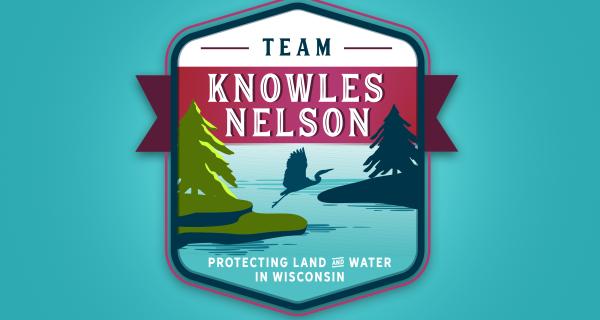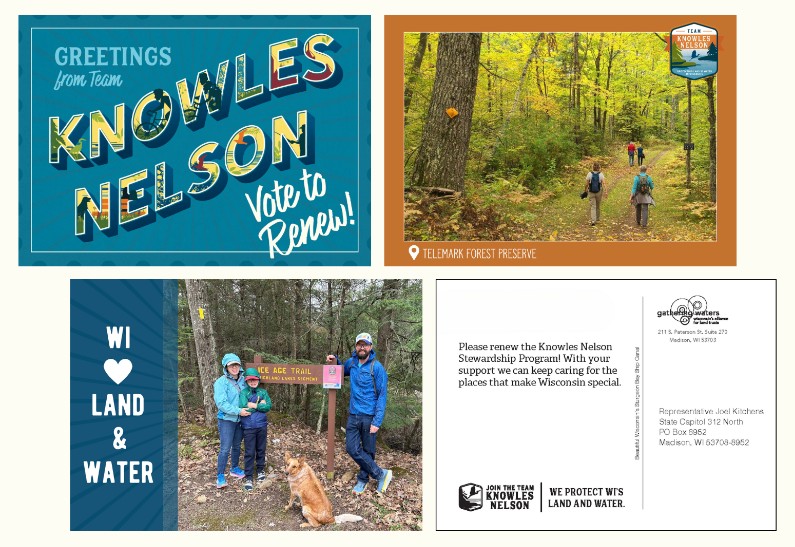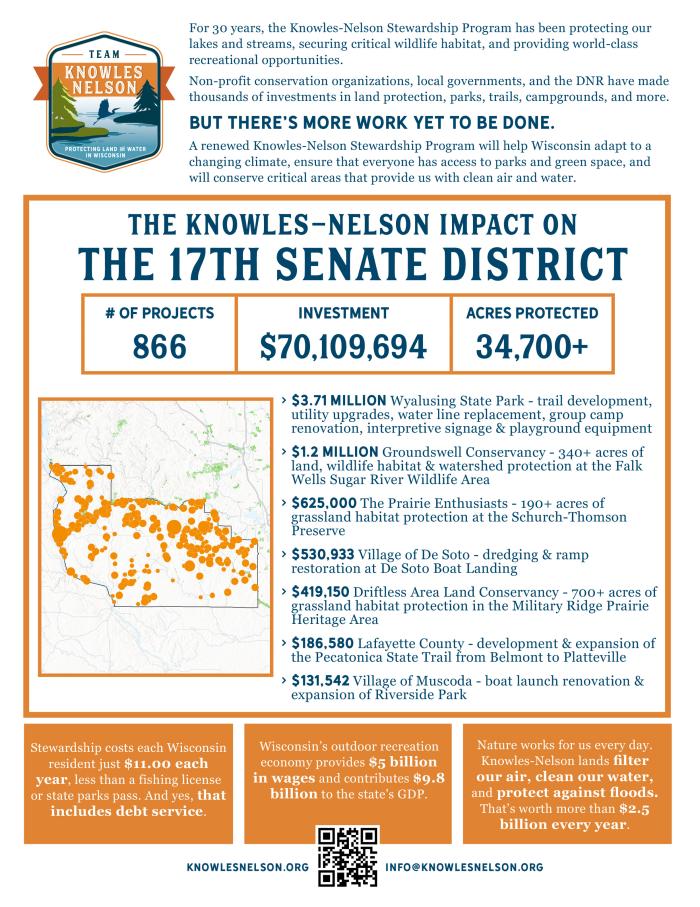Speak Out

Your voice is needed to fund the Knowles-Nelson Stewardship Program and protect conservation jobs and partners
With the leadership of Gathering Waters, our Wisconsin land trust alliance, we're working hard to ensure that legislators understand the critical importance of renewing the Knowles-Nelson Stewardship Program in 2025. Without renewal, Wisconsin would lose its largest source of funding for land conservation and outdoor recreation. Your voice will help to ensure we can continue caring for our land, water, and wildlife. Use the button at the bottom of this page to send a message to your representative.
This critical Knowles-Nelson funding has made it possible to protect many of our nature preserves, including Sugar Creek Bluff, Kickapoo Caverns, Woodman Floodplain, New Amsterdam Grasslands, Trempealeau Lakes, Kickapoo Bottoms, Devils Backbone, Boscobel Bluffs, La Crosse River Conservancy, Tunnelville Cliffs, Angel Bluff, Fish Creek, Kaplan, Limery Road, Romance Woods, and Cassville Bluffs. Not only will these thousands of acres be protected forever, but they will also be open to the public to enjoy for generations to come.
There are FOUR things you can do to make a difference RIGHT NOW!
1. Visit the Knowles-Nelson TAKE ACTION page.
This resource is a treasure trove of ways to keep conservation efforts in Wisconsin moving forward. You will discover all sorts of advocacy tools, and get the latest information on what is happening across the state and in the legislature.
2. Send a post card to legislators (online!!).
Click the link to write a quick post card and Gathering Waters will print the card and mail it!

3. Help locally.
Never underestimate the power of showing up and contributing at the land trusts near you. Whether you are someone who loves to help outside and get dirty, or if you are more comfortable sealing envelopes or helping in the office, we can use your help to make conservation close to home a reality. Visit our Volunteer For the Wild page and let us know how you would like to help support our efforts, and BRING A FRIEND!
4. Learn more and share with others.
Read more below to understand how Knowles-Nelson is funded and to learn how these dollars have impacted communities in the Driftless, or visit https://gatheringwaters.org/advocacy-101/ to learn more. Below, you can view a PDF which shows each of our 9 counties and how Knowles-Nelson funding has contributed to conservation efforts in those counties below.
READ MORE:
How Knowles-Nelson is funded
We sometimes hear critics of Knowles-Nelson, or people just concerned about the state's financial health, question the use of bonds to fund the program. Let's take a look:
Like other long-term state investments (buildings and road construction, for example) Wisconsin funds Knowles-Nelson primarily through bonds. Think of bonds as a mortgage for public projects. Instead of paying the full cost upfront, Wisconsin borrows money today and pays it back over time. This allows us to protect important places now, while spreading the cost across the many years people will enjoy them and those places will work for us. If we conserve a wetland today, for example, it will filter water, mitigate floods, and provide wildlife habitat for as long as we keep that land conserved.
Let's look at the numbers. Governor Evers is expected to propose investing $100 million per year into Knowles-Nelson. For a $100 million bond, Wisconsin pays about $8 million each year in repayment costs. That means after one year, we get $100 million in conservation benefits for $8 million in costs. After five years, that's $500 million in protected lands and recreational areas for $40 million in annual costs. These bonds are paid off over 20 years, spreading the investment across generations.
It allows us to invest in our natural resources now and spread the cost out over a longer period of time. We do the same thing with highways and public buildings. A highway might last for 50 years. Maybe a school building lasts for 100 years. Nature lasts forever as long as we don't mess with it. So the investments we make in nature will just get more valuable over time, paying us back year after year. Knowles-Nelson currently costs just under $11 per resident per year, including both new projects and paying off previous bonds. It's not nothing, but we think $11 is a steal in exchange for protecting Wisconsin's special places and building the infrastructure we need to enjoy them.
The Wisconsin Policy Forum recently reported that overall debt levels in Wisconsin are the lowest they have been in a generation, and the state's multi-billion dollar surplus means we have some flexibility to make wise investments. Let's do what we can to make Knowles-Nelson one of those wise investments our state chooses to make in 2025.
Knowles-Nelson FAQ and Myths.pdf
Stewardship In The Spotlight
Check out a few recent Knowles-Nelson success stories. Explore more projects across Wisconsin on the interactive map at KnowlesNelson.org.
